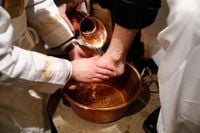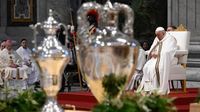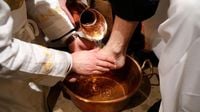Gründonnerstag, which falls on April 17, 2025, is a significant day in the Christian calendar, marking the Last Supper of Jesus with his disciples. This ritual is rich in symbolism and tradition, including the poignant act of foot washing, which serves as a powerful reminder of humility and service to others.
On this day, many priests perform the foot washing ceremony, where they kneel before members of their congregation, pour water over their feet, and dry them with a cloth. This act, reminiscent of Jesus washing his disciples' feet, symbolizes the idea that true leadership is rooted in serving others. As stated in the Bible, Jesus said, "I have given you an example that you should do as I have done to you," reflecting the core message of love and humility that underpins the Christian faith.
Foot washing was a common practice in ancient times, primarily for hygiene, as people traveled on dusty roads wearing sandals. However, its significance transcends mere cleanliness. In the Catholic Church, the priest typically washes the feet of twelve parishioners, representing the twelve apostles. This tradition gained renewed attention in 2013 when Pope Francis broke convention by washing the feet of prisoners, including a Catholic woman and a Muslim woman, emphasizing that this gesture of service is universal and not confined to any particular group.
Since 2016, women have been officially allowed to participate in the foot washing within the Catholic Church, furthering the message of inclusivity and equality. While the Evangelical Church does not traditionally include foot washing in their Gründonnerstag services, it may be observed in special devotions or ecumenical events, focusing on the symbolic nature of the act rather than the ritual itself.
Gründonnerstag is not just about the foot washing; it also commemorates the Last Supper, where Jesus broke bread and shared wine, establishing the Eucharist, a central sacrament in Christianity. This act of sharing symbolizes unity and community among believers. The name "Gründonnerstag" itself has various interpretations, with one common theory linking it to the Middle High German word "greinen," which means "to lament." This association may refer to the sorrowful events that followed the Last Supper, including Jesus’ betrayal by Judas.
Another theory suggests that the term "Grün" relates to the practice of eating green foods on this day, symbolizing renewal and purification. In many households, it is customary to prepare dishes like spinach with fried eggs, herb soups, or salads, reflecting the arrival of spring and the cleansing of body and spirit.
In Germany, Gründonnerstag is not a public holiday, meaning it is treated as a regular working day unless it coincides with the Easter holidays. This aspect impacts how people observe the day, balancing between work obligations and participation in religious rituals.
Church customs on Gründonnerstag include not only foot washing and the Last Supper mass but also silent altars, where altars are stripped bare and crosses covered as a sign of mourning. Many congregations also engage in the "Hour of Gethsemane," where they pray in remembrance of Jesus’ agony in the garden. In some regions, the traditional ringing of church bells is replaced with the sound of rattles, symbolizing the somber mood of the day.
As families gather for meals, the emphasis on green foods serves both a culinary and symbolic purpose. The tradition of the Gründonnerstags-Brezel (pretzel) in Thuringia, believed to protect against misfortune, is one of many regional customs that enrich the observance of this day. Additionally, in some areas, children start their Easter egg hunts on Gründonnerstag, blending festive joy with the solemnity of the occasion.
In the Vatican, Gründonnerstag will be marked by the Chrisam Mass, led by Cardinal Domenico Calcagno at 9:25 AM. During this service, the three holy oils—chrism, oil of catechumens, and oil of the sick—will be consecrated, and the priestly vows will be renewed, emphasizing the community and continuity of the Church. Later in the evening, the Mass of the Lord's Supper will commence, presided over by Cardinal Mauro Gambetti, marking the official beginning of the Triduum Sacrum, the three holy days leading to Easter.
Pope Francis has often celebrated the Mass of the Lord's Supper in prisons, highlighting his commitment to serving those who suffer. This practice reinforces the message that the call to serve is not limited to the church but extends to all of humanity.
As Gründonnerstag approaches, it serves as a poignant reminder of the values of humility, service, and community that are central to the Christian faith. Whether observed in church services or at home with family meals, the day invites reflection on the deeper meanings of Easter and the enduring importance of compassion and connection among people.
In a world often driven by individualism and competition, the act of foot washing stands out as a powerful symbol of equality and respect. It challenges individuals to consider their relationships with others, fostering a spirit of humility and service that resonates deeply across cultures and generations.
As communities prepare to observe Gründonnerstag, whether through solemn rituals or festive gatherings, the day encapsulates a blend of celebration and reflection, marking the transition from Lent to the joy of Easter.








